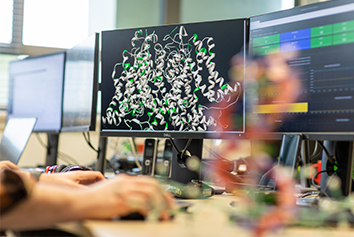Machine-learning, robotics and biology to deliver drug discovery of tomorrow

Biology 2.0: Combining machine-learning, robotics and biology to deliver drug discovery of tomorrow
Intelligent OMICS, Arctoris and Medicines Discovery Catapult test in silico pipeline for identifying new molecules for cancer treatment.
Medicines discovery innovators, Intelligent OMICS, supported by Arctoris and Medicines Discovery Catapult, are applying artificial intelligence to find new disease ‘drivers’ and candidate drugs for lung cancer. This collaboration, backed by Innovate UK, will de-risk future R&D projects and also demonstrate new cost and time-saving approaches to drug discovery.
Analysing a broad set of existing biological information, previously hidden components of disease biology can be identified which in turn lead to the identification of new drugs for development. This provides the catalyst for an AI-driven acceleration in drug discovery and the team has just won a significant Innovate UK grant in order to prove that it works.
Intelligent OMICS, the company leading the project, use in silico (computer-based) tools to find alternative druggable targets. They have already completed a successful analysis of cellular signalling pathways elsewhere in lung cancer pathways and are now selectively targeting the KRAS signalling pathway.
As Intelligent OMICS’ technology identifies novel biological mechanisms, Medicines Discovery Catapult will explore the appropriate chemical tools and leads that can be used against these new targets, and Arctoris will use their automated drug discovery platform in Oxford to conduct the biological assays which will validate them experimentally.
Working together, the group will provide druggable chemistry against the entire in silico pipeline, offering new benchmarks of cost and time effectiveness over conventional methods of discovery.
“Much has been written about the wonders of artificial intelligence and its potential in healthcare,” says Dr Simon Haworth, CEO of Intelligent OMICS. “Our newsflows are full of details of AI applications in process automation, image analysis and computational chemistry. The DeepMind protein folding breakthrough has also hit the headlines recently as a further AI application. But what does Intelligent OMICS do that is different?”
“By analysing transcriptomic and similar molecular data our neural networks algorithms re-model known pathways and identify new, important targets. This enables us to develop and own a broad stream of new drugs. Lung cancer is just the start – we have parallel programs running in many other areas of cancer, in infectious diseases, in auto-immune disease, in Alzheimer’s and elsewhere.”
“We have to thank Innovate UK for backing this important work. The independent validation of our methodology by the highly respected cheminformatics team at MDC coupled with the extraordinarily rapid, wet lab validation provided by Arctoris, will finally prove that, in drug discovery, the era of AI has arrived.”
Dr Martin-Immanuel Bittner, Chief Executive Officer of Arctoris commented:
“We are thrilled to combine our strengths in robotics-powered drug discovery assay development and execution with the expertise in machine learning that Intelligent OMICS and Medicines Discovery Catapult possess. This unique setup demonstrates the next stage in drug discovery evolution, which is based on high quality datasets and machine intelligence. Together, we will be able to rapidly identify and validate novel targets, leading to promising new drug discovery programmes that will ultimately benefit patients worldwide.”
Prof. John P. Overington, Chief Informatics Officer at Medicines Discovery Catapult:
“Computational based approaches allow us to explore a top-down approach to identifying novel biological mechanisms of disease, which critically can be validated by selecting the most appropriate chemical modulators and assessing their effects in cellular assay technologies.”
“Working with Intelligent OMICS and with support from Arctoris we are delighted to play our part in laying the groundwork for computer-augmented, automated drug discovery. Should these methods indeed prove fruitful, it will be transformative for both our industry and patients alike.”
If this validation is successful, the partners will have established a unique pipeline of promising new targets and compounds for a specific pathway in lung cancer. But more than that they will also have validated an entirely new drug discovery approach which can then be further scaled to other pathways and diseases.











